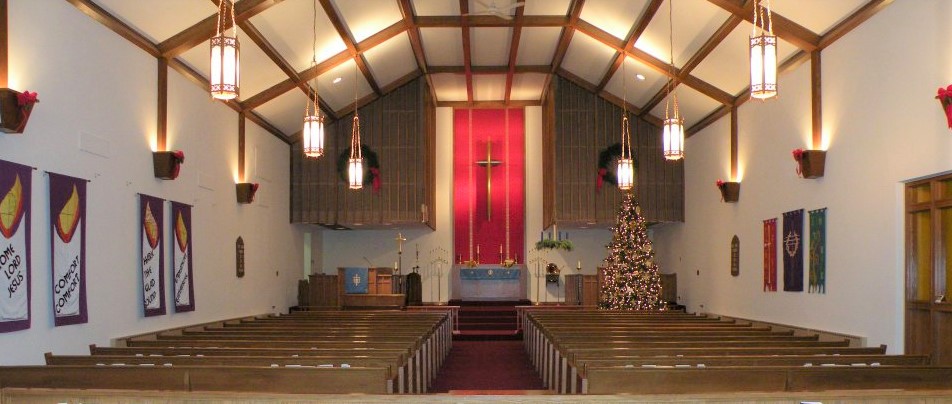12 06 2020 Sermon
Sunday, December 6, 2020 Mark 1:1-8; Isaiah 40:1-11
Over the past few months I have been doing a lot of hiking with Otto on several trails that were new to me in a few state parks that I had never explored before. Some of the parks maintain their trails better than others, and as the leaves fell off the trees and obscured the paths, it became much more challenging to navigate those less-well-marked trails. They follow the twists and turns of the landscape so as not to disturb nature, which requires paying close attention to the blazes on the trees or the trail map and not mindlessly following Otto as he runs off on deer paths or side trails to investigate interesting sounds and smells. I have a new appreciation for the gospel of Mark, quoting the words of Isaiah: In the wilderness prepare the way of the Lord, make straight the pathway for our God.
We talked a bit last week about Mark’s gospel beginning not with the birth of Christ but with an adult John the Baptist preparing the way for the ministry of an adult Jesus. We know some of the back story from the other gospels, including a pregnant Mary’s visit to her cousin Elizabeth, John the Baptist’s mother, when the yet-to-be-born John jumps with joy in Elizabeth’s womb to acknowledge the yet-to-be-born Jesus. But according to Mark, one day John just appeared in the wilderness, proclaiming a baptism of repentance and making certain the people knew that he was only the messenger sent ahead of the more powerful one who was to come. Even if we missed the signs of John’s clothing and diet that identify him with the Old Testament prophets, Mark directly quotes Isaiah’s prophesy of the voice crying out in the wilderness to prepare the way of the Lord.
As much as Jesus’ birth in a Bethlehem stable instead of a Jerusalem palace signaled God’s unexpected activity in the world, so are we meant to sit up and take notice that for Mark, the good news starts out in the wilderness. The wilderness is probably not the first place we expect to see God at work, as certainly John and Jesus’ contemporaries expected the Messiah to show up in the center of human political power and religious observance. They would have looked to Jerusalem and the Temple for the one who would lead them in power and glory. Yet what happened instead was that all the people from both the countryside and the big city of Jerusalem headed into the wilderness to hear John preach, to be baptized by him, and to respond with confession. It was not in temples or palaces built by human hands but in the wilderness that the presence and movement of God were revealed.
That good news sounds like even better news to me now than in any Advent I have experienced before. I am used to using these weeks of Advent to prepare the way of the Lord in certain ways and in particular places, with familiar traditions, but many of those ways to prepare are simply not available this year. No Christmas concerts, no Journey to Bethlehem or Christmas pageant, no shopping at the mall, no Advent open houses or Christmas parties, no worship services with you by candlelight here in the sanctuary, no Christmas dinner with family. All of the ways we are used to looking for the coming of the Lord are, at best, altered, and many aren’t safe for us to do this year at all. We are out in the wilderness—and yet that is exactly where God calls us to prepare the way.
Perhaps with the limitations on what we feel we can do right now, we can more clearly see that our task is not to make a straight pathway for ourselves to make our way to God. God is always the one who is on the move, coming to us. It’s why we sing “O Come, O Come Emmanuel” and not “O Go, O Go” to each other. God comes to us in the wilderness, because that’s where we are and therefore where we need God to be. We might be more aware in the midst of our current crisis than we usually are of our need, of our fear, of the death that needs to be defeated and the darkness that needs to be driven out by the light of Christ. But in truth, the wilderness, the chaos, the mess is always part of the human experience, so that is where God comes to meet us. The preparation we undertake is not fixing everything for God’s arrival; it’s perceiving the need for God to come, to intervene, to rescue and redeem. If we can’t think of what God needs to restore, in us and in our world, we don’t have much reason to be joyful at God’s arrival.
We may not be able to meet God where we usually do, but God is coming to meet us nonetheless. That is the point of the incarnation—that nothing, not even human frailty, will stop God from reaching out to us in love. In this season of waiting and watching, of hoping and longing, may we be on the lookout so we are able to lift up our voices with the prophets and say, “Here is our God!” whose good news reaches us not in spite of us wandering in the wilderness but because God seeks to walk with us there.

